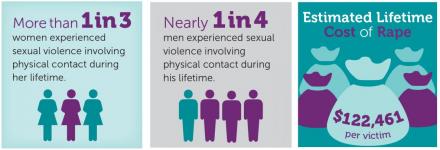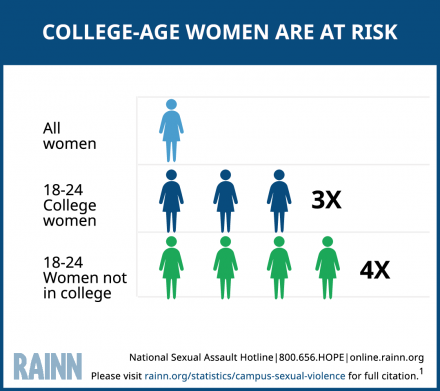
Sexual Assault Awareness & Prevention Month
DEA Headquarters Division - Public Information Office
Sexual Assault Awareness and Prevention Month calls attention to the fact that sexual violence is widespread and it brings advocates and communities together to help prevent these crimes.
Every 73 seconds, an American is sexually assaulted. And every 9 minutes, that victim is a child.
Each one of us can help promote healthy and positive relationships that are based on respect, safety and equality.
Sexual violence is sexual activity when consent is not obtained or freely given. It is a serious public health problem in the United States that profoundly impacts lifelong health, opportunity, and well-being. Sexual violence impacts every community and affects people of all genders, sexual orientations, and ages. Anyone can experience or perpetrate sexual violence.
The perpetrator of sexual violence is usually someone the victim knows, such as a friend, current or former intimate partner, coworker, neighbor, or family member. Sexual violence can occur in person, online, or through technology, such as posting or sharing sexual pictures of someone without their consent, or non-consensual sexting. www.cdc.gov
Drug-facilitated sexual assault occurs when alcohol or drugs are used to compromise an individual’s ability to consent to sexual activity. These substances make it easier for a perpetrator to commit sexual assault because they inhibit a person’s ability to resist and can prevent them from remembering the assault.

Drug-facilitated sexual assault occurs when alcohol or drugs are used to compromise an individual’s ability to consent to sexual activity. These substances make it easier for a perpetrator to commit sexual assault because they inhibit a person’s ability to resist and can prevent them from remembering the assault.
Alcohol remains the most commonly used drug in crimes of sexual assault. Drugs being used by perpetrators in crimes of sexual assault include, but are not limited to, Rohypnol, GHB (Gamma Hydroxybutyric Acid), GBL (Gamma-Butyrolactone), and ketamine. In certain amounts, any drug can leave you helpless.
Sexual assault can happen anywhere including college campuses. Being aware of the risks of sexual assault and learning how to protect yourself, especially first year students in a new environment, is important for all students in colleges and universities. According to RAINN:
-
13% of all students experience rape or sexual assault through physical force, violence or incapacitations (among all graduate and undergraduate students).
-
Among undergraduate students, 26.4% of females and 6.8% of males experience rape or sexual assault through physical force, violence or incapacitation.
-
Among graduate and professional students, 9.7% of females and 2.5% of males experience rape or sexual assault through physical force, violence, or incapacitation.
The consequences of sexual violence are physical, like bruising and genital injuries, and psychological, such as depression, anxiety, and suicidal thoughts.
The consequences may also be chronic. Victims may suffer from post-traumatic stress disorder, experience re-occurring reproductive, gastrointestinal, cardiovascular, and sexual health problems.
Sexual violence is also linked to negative health behaviors. For example, victims are more likely to smoke, abuse alcohol, use drugs, and engage in risky sexual activity.
The trauma resulting from sexual violence can have an impact on a survivor’s employment in terms of time off from work, diminished performance, job loss, or being unable to work. These issues disrupt earning power and have a long-term effect on the economic well-being of survivors and their families. Coping and completing everyday tasks after victimization can be challenging. Victims may have difficulty maintaining personal relationships, returning to work or school, and regaining a sense of normalcy.
Sexual Violence Is More Prevalent at College, Compared to Other Crimes
About 1 in 5 college-aged female survivors received assistance from a victim services agency.
23.1% of TGQN (transgender, genderqueer, nonconforming) college students have been sexually assaulted.
https://www.rainn.org/statistics/campus-sexual-violence
Additionally, sexual violence is connected to other forms of violence.

For example, girls who have been sexually abused are more likely to experience additional sexual violence and other forms of violence and be a victim of intimate partner violence in adulthood. Perpetrating bullying in early middle school is linked to sexual harassment perpetration in high school https://rainn.org/.
Sexual violence can affect many aspects of a survivor's life, including safety and health, family and work situations, and finances. These challenges often lead to perplexing personal and legal questions. To receive basic assistance, victims often must navigate a maze of governmental and community agencies.
For help and support, there is a national network of community-based rape crisis centers with centers available in every state and territory. This confidential assistance includes advocacy, accompaniment during medical exams and law enforcement interviews; education; follow-up services and referrals to other resources.
There are also Sexual Assault Response Teams (SARTs) to help survivors with community services available to them, and uses the experiences of survivors to improve those services www.nsvrc.org/sarts.
Visit the resources below to learn more about sexual violence, supporting survivors and preventing sexual violence before it ever happens.
Resources on Rape, Sexual Assault and Domestic Violence
|
Rape Abuse & Incest National Network (RAINN) |
Get help 24/7 1-800-656-4673. |
|
National Sexual Violence Resource Center |
|
|
Office for Victims of Crime Directory of Crime Victim Services |
|
|
Centers for Disease Control and Prevention (CDC) |
https://www.cdc.gov/violenceprevention/sexualviolence/index.html |
|
National Center for Victims of Crime, Victim Connect Resource Center |
1-855-4-VICTIM (1-855-484-2846) |
|
National Center for Victims of Crime |
|
|
National Domestic Violence Hotline |
1-800-799-SAFE (7233) or 1-800-787-3224 (TTY) |
|
Office for Victims of Crime |
To Contact the Office of Overseas Citizens Services |
|
Americans Overseas Domestic Violence Crisis Center |
International Toll Free (24/7) |
|
National Suicide Prevention Lifeline |
1-800-273-8255 (TALK) |
|
National Human Trafficking Hotline |
1-888-373-7888 |
|
National Indigenous Women’s Resource Center |
1-855-649-7299 |
CHILDREN |
|
|
National Child Abuse Hotline/Child Help |
1-800-4-A-CHILD (1-800-422-4453) |
|
Child Welfare League of America |
202-638-2952 |
TEEN |
|
|
National Teen Dating Abuse Hotline |
Hotline: 1-866-331-9474 |
|
Break the Cycle |
202-824-0707 |
Provided by the DEA Victim Witness Assistance Program.
The inclusion of a link on this website does not constitute an official endorsement, guarantee, or approval by DEA
DEA Victim Witness Assistance Program. Provides victim assistance, training, guidance, and case support to domestic and international DEA offices; collaboration with federal, state, tribal and local law enforcement and national, state, tribal and local victim focused organizations. For more info, https://www.dea.gov/resources/vwap.
